Story Highlights
- Faith lacking in former Soviet Union, Latin America
- Ukrainians among least confident in the world before revolution
WASHINGTON, D.C. -- Slightly more than 50% of adults across 123 countries surveyed in 2013 expressed confidence in their judicial systems and courts. In 73 of these countries, less than half of residents are confident in their country's judicial system, illustrating the importance of one of the United Nations' new Sustainable Development Goals (SDGs): to "promote rule of law at the national and international levels, and ensure equal access to justice for all."
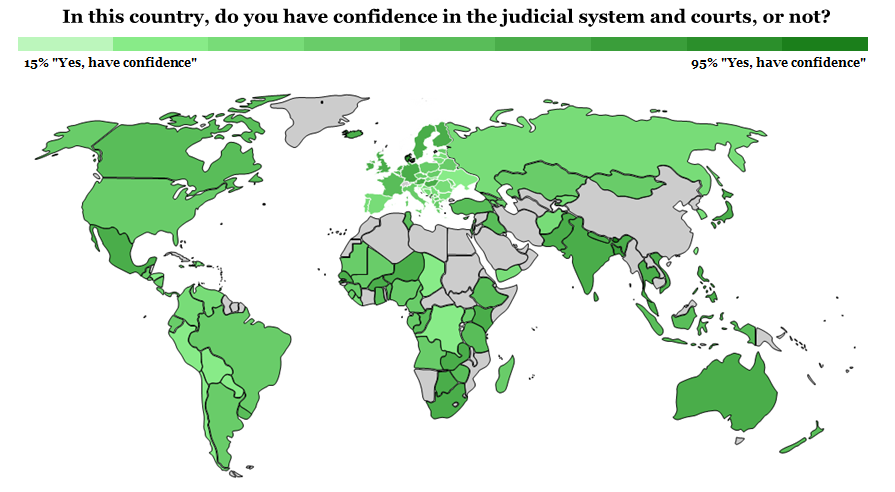
The U.N.'s SDGs build on the Millennium Development Goals, focusing on action-oriented, global goals that address key challenges for the post-2015 development agenda. This emphasis on the rule of law in the SDG framework reflects the important role it plays in governance, investment, trade and fundamental issues of law and order.
Confidence Highest in Asia
Regionally, confidence in the rule of law is highest in Asia, where nearly two in three adults (65%) express faith in their judicial systems and courts. In no other region do more than half of residents express such confidence, with overall figures from Latin America (35%) and the countries of the former Soviet Union (28%) among the lowest in the world.
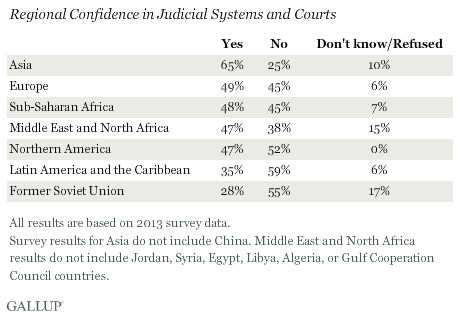
However, results also vary widely within Asia, from as high as 95% in Bhutan to as low as 23% in Taiwan. (Gallup did not ask this question in China.) Residents of many countries in South Asia -- including Bhutan, Bangladesh, India, Sri Lanka and Nepal -- were among the most likely in the region to express confidence.
Indians' strong confidence in judicial systems most likely reflects visible efforts to strengthen rule of law such as high-profile cases in which the judiciary ruled against corrupt politicians, businessmen and celebrities and held them accountable. This, in addition to improvements in the Right to Information Act and fast-track courts, may have bolstered confidence in the judicial system and courts. On the other hand, high confidence levels expressed in South Asian countries such as Bhutan more likely reflect residents' tendency to resolve matters at the individual level rather than in the courts.
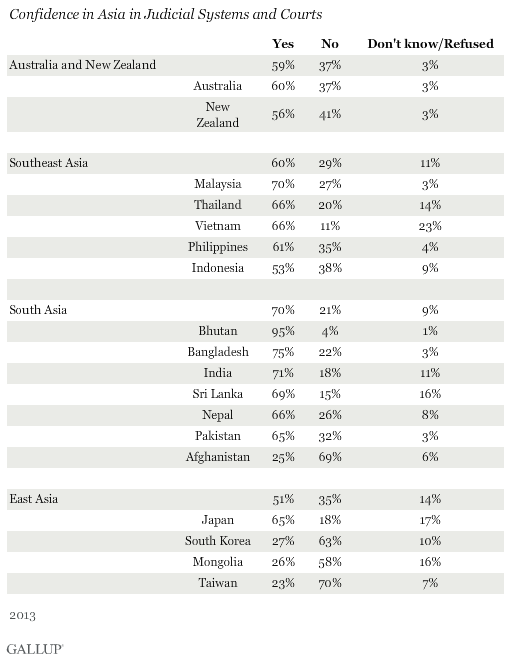
It should also be noted that some Asian countries, such as Laos and Vietnam, are more closed societies -- places where residents may be hesitant to express a lack of confidence in the courts. This reticence most likely stems from fear that lack of confidence in courts could be considered criticism of the government.
Confidence Lowest in Former Soviet Union Countries and Latin America
Residents living in the former Soviet Union (FSU) region are the least likely to express confidence in their judicial systems, at 28%. Results within the FSU also range widely, from 72% in the Nagorno-Karabakh region to 16% in Ukraine -- one of the lowest ratings in the world.
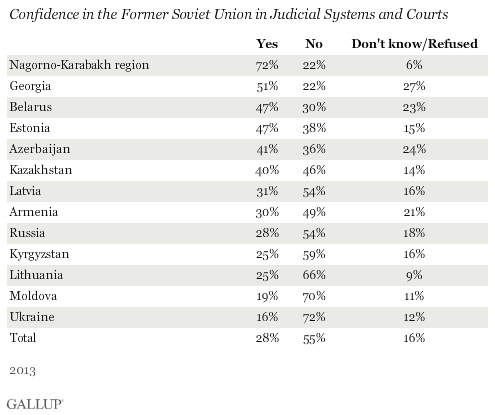
The history of strongly centralized government in this region likely continues to affect residents' confidence in judicial systems and courts today. Minority Rights Group International identifies the North Caucasus region, the most ethnically volatile region in the FSU, as an area subject to harassment and prejudice by Russian authorities. Furthermore, the ethnic divisions and claims of ethnic cleansing in former Soviet states such as Armenia and Azerbaijan likely also continue to impair confidence in the rule of law.
Residents of Latin America also have low confidence in their judicial systems and courts. This region's history of centralized governance, weak rule of law and systemic corruption helps explain the lack of confidence in judicial systems and courts in most countries. Peru's numbers, the lowest in Latin America, have been consistently low since tracking began in 2006. These numbers likely reflect the damage done to the rule of law by corruption scandals propagated under former Peruvian President Alberto Fujimori and the perception that his successors, Alan Garcia and Ollanta Humala, have done little to address Peru's corruption problem. In 2012, the U.S. Department of State identified that while Peru's law establishes an independent judiciary, corruption taints the judicial system and prevents independent operation.
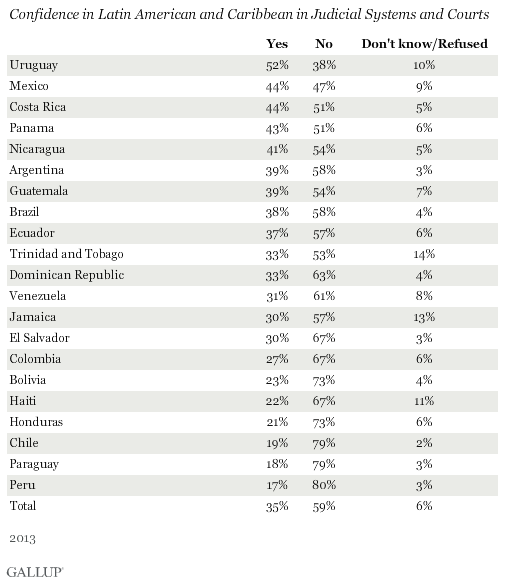
Implications
Increased emphasis on the rule of law has far-reaching implications for the stability and growth of societies. Confidence in the rule of law is, in many ways, a determinant of economic and social development. Investment and innovation occur when individuals are confident in the economic situation at the local and national level. Absence of a strong rule of law threatens growth and development and can lead to either speculative investment or long-term, low-capital investments.
The stagnant global level of confidence in judicial systems and courts and the relatively low scores in many countries represent an opportunity to strengthen the rule of law in an effort to cultivate peaceful and inclusive societies. Addressing the hindrances to confidence in judicial systems and courts is crucial for societies to experience desired social and economic growth and long-term sustainable development.
Data on this item are available in Gallup Analytics. For complete data sets or custom research from the more than 150 countries Gallup continually surveys, please contact us.
Survey Methods
Results are based on telephone and face-to-face interviews with approximately 1,000 adults in each country, aged 15 and older, conducted from 2008 to 2013. For results based on the total sample of national adults, the margin of sampling error ranges from ±2.1 percentage points to ±5.6 percentage points at the 95% confidence level.
While this question was fielded in 123 countries, results for Asia and Middle East and North Africa do not include certain countries given the political sensitivity of this question. Gallup did not ask this question in China, Jordan, Syria, Egypt, Libya, Algeria, or Gulf Cooperation Council countries.
For more complete methodology and specific survey dates, please review Gallup's Country Data Set details. Learn more about how the Gallup World Poll works.

